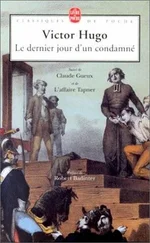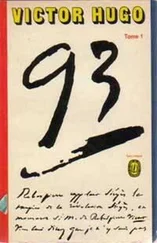Victor Hugo - Ninety-Three
Здесь есть возможность читать онлайн «Victor Hugo - Ninety-Three» — ознакомительный отрывок электронной книги совершенно бесплатно, а после прочтения отрывка купить полную версию. В некоторых случаях можно слушать аудио, скачать через торрент в формате fb2 и присутствует краткое содержание. Жанр: literature_19, foreign_antique, foreign_prose, на английском языке. Описание произведения, (предисловие) а так же отзывы посетителей доступны на портале библиотеки ЛибКат.
- Название:Ninety-Three
- Автор:
- Жанр:
- Год:неизвестен
- ISBN:нет данных
- Рейтинг книги:3 / 5. Голосов: 1
-
Избранное:Добавить в избранное
- Отзывы:
-
Ваша оценка:
- 60
- 1
- 2
- 3
- 4
- 5
Ninety-Three: краткое содержание, описание и аннотация
Предлагаем к чтению аннотацию, описание, краткое содержание или предисловие (зависит от того, что написал сам автор книги «Ninety-Three»). Если вы не нашли необходимую информацию о книге — напишите в комментариях, мы постараемся отыскать её.
Ninety-Three — читать онлайн ознакомительный отрывок
Ниже представлен текст книги, разбитый по страницам. Система сохранения места последней прочитанной страницы, позволяет с удобством читать онлайн бесплатно книгу «Ninety-Three», без необходимости каждый раз заново искать на чём Вы остановились. Поставьте закладку, и сможете в любой момент перейти на страницу, на которой закончили чтение.
Интервал:
Закладка:
The monstrous gun was left to itself. It was its own mistress, and mistress of the ship. It could do with it whatsoever it wished. This crew, accustomed to laugh in battle, now trembled. It would be impossible to describe their terror.
Captain Boisberthelot and Lieutenant la Vieuville, brave men though they were, paused at the top of the ladder, silent, pale, and undecided, looking down on the deck. Some one pushed them aside with his elbow, and descended. It was their passenger, the peasant, the man about whom they were talking a moment ago.
Having reached the bottom of the ladder he halted.
V
VIS ET VIR
The cannon was rolling to and fro on the deck. It might have been called the living chariot of the Apocalypse. A dim wavering of lights and shadows was added to this spectacle by the marine lantern, swinging under the deck. The outlines of the cannon were indistinguishable, by reason of the rapidity of its motion; sometimes it looked black when the light shone upon it, then again it would cast pale, glimmering reflections in the darkness.
It was still pursuing its work of destruction. It had already shattered four other pieces, and made two breaches in the ship's side, fortunately above the water-line, but which would leak in case of rough weather. It rushed frantically against the timbers; the stout riders resisted, – curved timbers have great strength; but one could hear them crack under this tremendous assault brought to bear simultaneously on every side, with a certain omnipresence truly appalling.
A bullet shaken in a bottle could not produce sharper or more rapid sounds. The four wheels were passing and repassing over the dead bodies, cutting and tearing them to pieces, and the five corpses had become five trunks rolling hither and thither; the heads seemed to cry out; streams of blood flowed over the deck, following the motion of the ship. The ceiling, damaged in several places, had begun to give way. The whole ship was filled with a dreadful tumult.
The captain, who had rapidly recovered his self-possession, had given orders to throw down the hatchway all that could abate the rage and check the mad onslaught of this infuriated gun; mattresses, hammocks, spare sails, coils of rope, the bags of the crew, and bales of false assignats, with which the corvette was laden, – that infamous stratagem of English origin being considered a fair trick in war.
But what availed these rags? No one dared to go down to arrange them, and in a few moments they were reduced to lint.
There was just sea enough to render this accident as complete as possible. A tempest would have been welcome. It might have upset the cannon, and with its four wheels once in the air, it could easily have been mastered. Meanwhile the havoc increased. There were even incisions and fractures in the masts, that stood like pillars grounded firmly in the keel, and piercing the several decks of the vessel. The mizzen-mast was split, and even the main-mast was damaged by the convulsive blows of the cannon. The destruction of the battery still went on. Ten out of the thirty pieces were useless. The fractures in the side increased, and the corvette began to leak.
The old passenger, who had descended to the gun-deck, looked like one carved in stone as he stood motionless at the foot of the stairs and glanced sternly over the devastation. It would have been impossible to move a step upon the deck.
Each bound of the liberated carronade seemed to threaten the destruction of the ship. But a few moments longer, and shipwreck would be inevitable.
They must either overcome this calamity or perish; some decisive action must be taken. But what?
What a combatant was this carronade!
Here was this mad creature to be arrested, this flash of lightning to be seized, this thunderbolt to be crushed. Boisberthelot said to Vieuville: —
"Do you believe in God, chevalier?"
"Yes and no, sometimes I do!" replied La Vieuville.
"In a tempest?"
"Yes, and in moments like these."
"Truly God alone can save us," said Boisberthelot.
All were silent, leaving the carronade to its horrible uproar.
The waves beating the ship from without answered the blows of the cannon within, very much like a couple of hammers striking in turn.
Suddenly in the midst of this inaccessible circus, where the escaped cannon was tossing from side to side, a man appeared, grasping an iron bar. It was the author of the catastrophe, the chief gunner, whose criminal negligence had caused the accident, – the captain of the gun. Having brought about the evil, his intention was to repair it. Holding a handspike in one hand, and in the other a tiller rope with the slip-noose in it, he had jumped through the hatchway to the deck below.
Then began a terrible struggle; a titanic spectacle; a combat between cannon and cannoneer; a contest between mind and matter; a duel between man and the inanimate. The man stood in one corner in an attitude of expectancy, leaning on the rider and holding in his hands the bar and the rope; calm, livid, and tragic, he stood firmly on his legs, that were like two pillars of steel.
He was waiting for the cannon to approach him.
The gunner knew his piece, and he felt as though it must know him. They had lived together a long time. How often had he put his hand in its mouth. It was his domestic monster. He began to talk to it as he would to a dog. "Come," said he. Possibly he loved it.
He seemed to wish for its coming, and yet its approach meant sure destruction for him. How to avoid being crushed was the question. All looked on in terror.
Not a breath was drawn freely, except perhaps by the old man, who remained on the gun-deck gazing sternly on the two combatants.
He himself was in danger of being crushed by the piece; still he did not move.
Beneath them the blind sea had command of the battle. When, in the act of accepting this awful hand-to-hand struggle, the gunner approached to challenge the cannon, it happened that the surging sea held the gun motionless for an instant, as though stupefied. "Come on!" said the man. It seemed to listen.
Suddenly it leaped towards him. The man dodged. Then the struggle began, – a contest unheard of; the fragile wrestling with the invulnerable; the human warrior attacking the brazen beast; blind force on the one side, soul on the other.
All this was in the shadow. It was like an indistinct vision of a miracle.
A soul! – strangely enough it seemed as if a soul existed within the cannon, but one consumed with hate and rage. The blind thing seemed to have eyes. It appeared as though the monster were watching the man. There was, or at least one might have supposed it, cunning in this mass. It also chose its opportunity. It was as though a gigantic insect of iron was endowed with the will of a demon. Now and then this colossal grasshopper would strike the low ceiling of the gun-deck, then falling back on its four wheels, like a tiger on all fours, rush upon the man. He – supple, agile, adroit – writhed like a serpent before these lightning movements. He avoided encounters; but the blows from which he escaped fell with destructive force upon the vessel. A piece of broken chain remained attached to the carronade. This bit of chain had twisted in some incomprehensible way around the breech-button.
One end of the chain was fastened to the gun-carriage; the other end thrashed wildly around, aggravating the danger with every bound of the cannon. The screw held it as in a clenched hand, and this chain, multiplying the strokes of the battering-ram by those of the thong, made a terrible whirlwind around the gun, – a lash of iron in a fist of brass. This chain complicated the combat.
Despite all this, the man fought. He even attacked the cannon at times, crawling along by the side of the ship and clutching his handspike and the rope; the cannon seemed to understand his movements, and fled as though suspecting a trap. The man, nothing daunted, pursued his chase.
Читать дальшеИнтервал:
Закладка:
Похожие книги на «Ninety-Three»
Представляем Вашему вниманию похожие книги на «Ninety-Three» списком для выбора. Мы отобрали схожую по названию и смыслу литературу в надежде предоставить читателям больше вариантов отыскать новые, интересные, ещё непрочитанные произведения.
Обсуждение, отзывы о книге «Ninety-Three» и просто собственные мнения читателей. Оставьте ваши комментарии, напишите, что Вы думаете о произведении, его смысле или главных героях. Укажите что конкретно понравилось, а что нет, и почему Вы так считаете.












